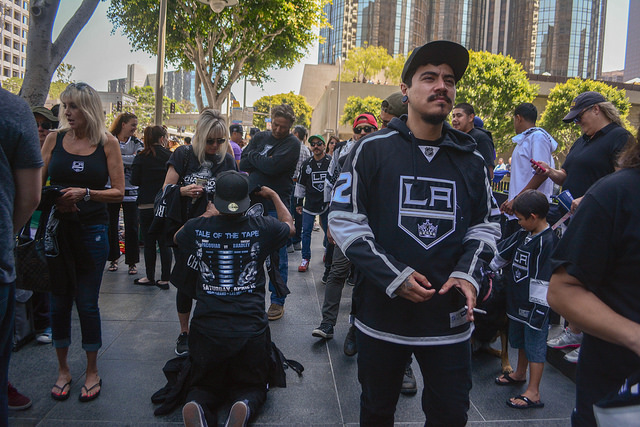USC Sports Business Association Panel Talks Clippers Crisis, Social Media
The USC Sports Business Association held a panel entitled "A Behind the Scenes Look at LA Sports Teams" Monday night in the Ronald Tutor Campus Center.
An enlightening and informative dicussion developed between the students and the professional panel, which included Mark Madsen, assistant coach and former dancer for the Lakers, Steven Esperaza, Assistant Director of Communciations for the Clippers, Jonathan Lowe, VP of Marketing for the Kings, Blain Skinner, Executive Director of Corporate Partnerships for the Lakers and Bobby Scales, Director of Player Development for the Angels.
Moderated by USC professor Jeff Fellenzer, the hour-and-a-half-long discussion ranged in subject from crisis management, specifically pertaining to the Donald Sterling scandal, to the social media epidemic in clubhouses.
Esperaza offered insider information into how his office handled the release of the inflammatory Sterling tapes earlier this year.
"It was a nightmare," he explained to the nearly 70 students at the panel. "It was a crash course in communciations that I could probably teach now.
"The reason Sterling doesn't own the team anymore is because of what you saw on television...He said he didn't need our help and went rogue. We used to only let him speak to the Los Angeles Times once a year, and now everyone knows the reason."
Esperaza also detailed how, in the wake of the scandal and amidst national scrutiny, his department effectively won back the public's trust through the guerrilla "We Are One" marketing campaign.
"My boss and I came up with 'We Are One'," he divulged. "When we pitched it to the NBA, they said we were on our own. So we put the logo up on our site where our sponsors used to be.
"Then, other teams caught on and did the same thing. Only then did the league catch on and began selling t-shirts."
The longtime Clippers employee also stated that when the team wore their warm-up gear inside out before Game 1 of their first post-scandal playoff game against Golden State, the players acted alone without telling the organization, but "they were speaking for us."
SEE ALSO: USC Sports Business Association Talks Money And Athletes
There were other important takeaways from the panel discussion besides insider details about Los Angeles executive malpractice.
The rise of social media involvement from marketing teams and individual players was a major talking point amongst the panelists. Lowe, specifically, was intrigued by the possibilities of social media engagement with fans.
"It allows us to grow fans and break down the barrier between the fans and the organization," Lowe offered. "We're not just another organziation. We've tried to create a personality behind our Twitter handle and engage and respond to our followers and fans."

However, Madsen suggested that technologies and social media, while they are boons for marketing execs, can be a distraction for players in the locker room.
"Everybody's on their phones after the games," Madsen said. "Phil Jackson used to go around and shake everybody's hand after a game. Now after we shake hands, the players go back to their phones before they take a shower."
Esperaza chimed in, "Dealing with players tweeting gets harder and harder as they get younger and younger. A tweet is a press release. It's hard to muzzle a personal thought, but once it's on the internet, it's there forever."
Scales offered a fun anecdote about how the Inland Empire 66ers, a high-A Angels affiliate, developed an obsession with a mobile game, Clash of Clans.
"The players would communicate through the game about when to go to the batting cage," Scales laughed. "So I told the coach, you gotta get on the game too. So now he's on there messaging the guys like, 'Make sure we're out to stretch in time.'"
This theme of adaptation and doing everything it takes to win and succeed is a common one in sports among athletes, but it was equally prevalent among the panelists, who are now mostly businessmen.
Skinner, a 30-year-plus veteran in the Lakers organization and member of the Trojan family, suggested that the most important resource that college students have nowadays is LinkedIn, the social career building site. He urged his Trojan audience to curate a functional profile and actively connect with employers on the web.
Madsen, a fan favorite in the crowd, said that, above all, developing personal relationships was the key to success and claimed that when he won the Lakers assistant coaching job, his attitude and work ethic as a Lakers player back in the early 2000s was "the real interview."
Of all the advice that was dished out to the eager students, the most succinct and effective was from Scales, a long-time minor leaguer who only reached the majors ten years after being drafted:
"Just grind."
Follow the USC Sports Business Asoociation on Twitter and Facebook.
Reach Sports Director Jeremy Bergman via e-mail and follow him on Twitter.



